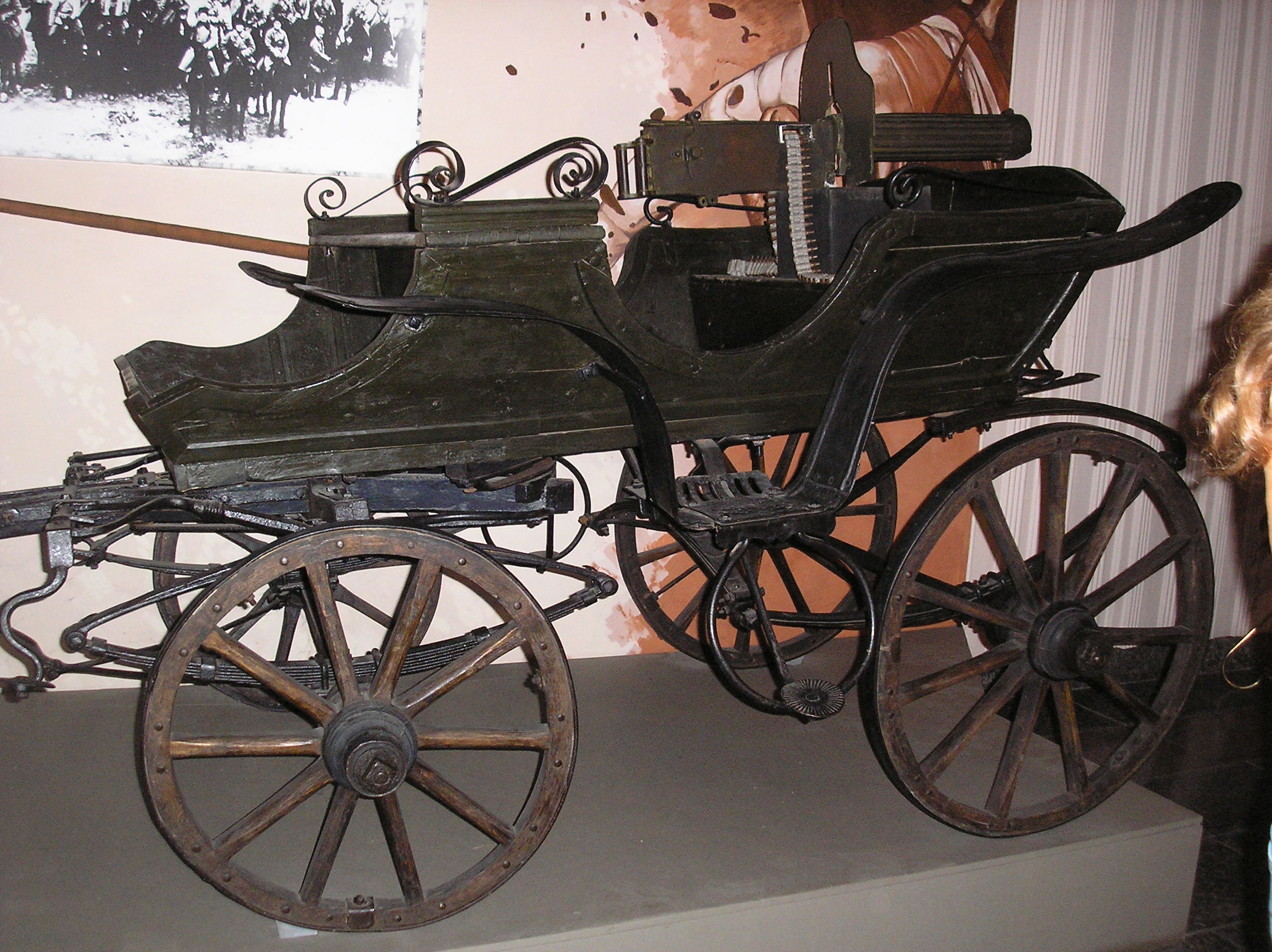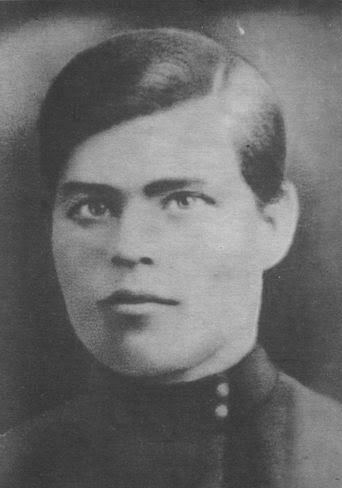|
Grigori Maslakov
Grigory Savelievich Maslakov, "Maslak" (1877-1921) was a Russian military leader during the Russian Civil War. Biography Grigori Maslakov was born in 1877 to a poor family in the Stavropol Territory. Until the revolution, he lived in the Salsky District of the Don Cossack Region, whose territory is now part of Russia and Ukraine. Before World War I, he served as a patrolman for the horse breeder Korolkov, after he entered the service in the equestrian artillery, where he rose to the rank of sergeant. On the side of the reds In February 1918, Maslakov created a Red partisan detachment in the Salsky District, at the head of which he fought against the Don Army atamans P.Kh. Popov and P.N. Krasnova. In May of the same year, Maslakov's partisans joined Boris Dumenko's detachment. In the brigade formed, the former sergeant became the squadron commander, then commanded the 1st cavalry regiment. In March 1919, Maslakov, along with division chief Dumenko and brigade commander Budyonny, ... [...More Info...] [...Related Items...] OR: [Wikipedia] [Google] [Baidu] |
Stavropol Krai
Stavropol Krai (russian: Ставропо́льский край, r=Stavropolsky kray, p=stəvrɐˈpolʲskʲɪj kraj) is a federal subjects of Russia, federal subject (a Krais of Russia, krai) of Russia. It is geographically located in the North Caucasus region in Southern Russia, and is administratively part of the North Caucasian Federal District. Stavropol Krai has a population of 2,786,281 (Russian Census (2010), 2010). Stavropol is the largest types of inhabited localities in Russia, city and the administrative center, capital of Stavropol Krai, and Pyatigorsk is the administrative center of the North Caucasian Federal District. Stavropol Krai is bordered by Krasnodar Krai to the west, Rostov Oblast to the north-west, Kalmykia to the north, Dagestan to the east, and Chechnya, Ingushetia, North Ossetia–Alania, Kabardino-Balkaria and Karachay-Cherkessia to the south. It is one of the most multi-ethnic federal subjects in Russia, with thirty-three ethnic groups with more than ... [...More Info...] [...Related Items...] OR: [Wikipedia] [Google] [Baidu] |
ROSSPEN
ROSSPEN or Political Encyclopedia Publishers (russian: РОССПЭН, Издательство «Политическая энциклопедия») is a Russian academic publisher. It is a major publisher of archival materials and research works in history of Russia and the Soviet Union. /ref> Its major works include the 100-volume series ''History of '' ("История сталинизма") (shortlisted for the International Freedom to Publish Award, |
Astrakhan
Astrakhan ( rus, Астрахань, p=ˈastrəxənʲ) is the largest city and administrative centre of Astrakhan Oblast in Southern Russia. The city lies on two banks of the Volga, in the upper part of the Volga Delta, on eleven islands of the Caspian Depression, 60 miles (100 km) from the Caspian Sea, with a population of 475,629 residents at the 2021 Census. At an elevation of below sea level, it is the lowest city in Russia. Astrakhan was formerly the capital of the Khanate of Astrakhan (a remnant of the Golden Horde), and was located on the higher right bank of the Volga, 7 miles (11 km) from the present-day city. Situated on caravan and water routes, it developed from a village into a large trading centre, before being conquered by Timur in 1395 and captured by Ivan the Terrible in 1556. In 1558 it was moved to its present site. The oldest economic and cultural center of the Lower Volga, [...More Info...] [...Related Items...] OR: [Wikipedia] [Google] [Baidu] |
Tsaritsyn
Volgograd ( rus, Волгогра́д, a=ru-Volgograd.ogg, p=vəɫɡɐˈɡrat), formerly Tsaritsyn (russian: Цари́цын, Tsarítsyn, label=none; ) (1589–1925), and Stalingrad (russian: Сталингра́д, Stalingrád, label=none; ) (1925–1961), is the largest city and the administrative centre of Volgograd Oblast, Russia. The city lies on the western bank of the Volga, covering an area of , with a population of slightly over 1 million residents. Volgograd is the sixteenth-largest city by population size in Russia, the second-largest city of the Southern Federal District, and the fourth-largest city on the Volga. The city was founded as the fortress of ''Tsaritsyn'' in 1589. By the nineteenth century, Tsaritsyn had become an important river-port and commercial centre, leading to its population to grow rapidly. In November 1917, at the start of the Russian Civil War, Tsaritsyn came under Bolshevik control. It fell briefly to the White Army in mid-1919 but Battle o ... [...More Info...] [...Related Items...] OR: [Wikipedia] [Google] [Baidu] |
2nd Cavalry Army
The 2nd Cavalry Army (russian: 2-я Конная армия) was a cavalry army of the Red Army during the Russian Civil War. History It was created by an order of the Revolutionary Military Council of the Southwestern Front on 16 July 1920 from the remnants of the 1st Cavalry Corps of Dmitry Zhloba, under the command of Oka Gorodovikov. The army, part of the Southwestern Front, included the 2nd, 16th, 20th, and 21st Cavalry Divisions and fielded about 5,500 men upon formation. In conjunction with the 13th Army, the 2nd Cavalry Army pushed the White Russian Army of General Pyotr Wrangel out of Alexandrovsk in July. It then fought in the Northern Taurida Operation during August, attacking the Russian Army bridgehead on the right bank of the Dnieper at Kakhovka. Filipp Mironov replaced Gorodovikov on 6 September. On the same day, the 20th Cavalry Division was disbanded and its troops used to reinforce the 2nd and 9th Cavalry Divisions. It was transferred to the reforme ... [...More Info...] [...Related Items...] OR: [Wikipedia] [Google] [Baidu] |
North Caucasus
The North Caucasus, ( ady, Темыр Къафкъас, Temır Qafqas; kbd, Ишхъэрэ Къаукъаз, İṩxhərə Qauqaz; ce, Къилбаседа Кавказ, Q̇ilbaseda Kavkaz; , os, Цӕгат Кавказ, Cægat Kavkaz, inh, Даькъасте, Däq̇aste, krc, Шимал Кавказ, Şimal Kavkaz, russian: Северный Кавказ, r=Severnyy Kavkaz, p=ˈsʲevʲɪrnɨj kɐfˈkas) or Ciscaucasia (russian: Предкавказье, Predkavkazye), is a subregion of Eastern Europe in the Eurasian continent. It is the northern part of the wider Caucasus region, and is entirely a part of Russia, sandwiched between the Sea of Azov and Black Sea to the west, and the Caspian Sea to the east. The region shares land borders with Georgia (country), Georgia and Azerbaijan to the south. Krasnodar is the largest city within the North Caucasus. Politically, the North Caucasus is made up of Russian Republics of Russia, republics and krais. It lies north of the Main C ... [...More Info...] [...Related Items...] OR: [Wikipedia] [Google] [Baidu] |
Revolutionary Insurrectionary Army Of Ukraine
The Revolutionary Insurgent Army of Ukraine ( uk, Революційна Повстанська Армія України), also known as the Black Army or as Makhnovtsi ( uk, Махновці), named after their leader Nestor Makhno, was an anarchist army formed largely of Ukrainian peasants and workers during the Russian Civil War of 1917–1922. They protected the operation of "free soviets" and libertarian communes by the Makhnovshchina, an attempt to form a stateless libertarian communist society from 1918 to 1921 during the Ukrainian War of Independence. They were founded and inspired based on the Black Guards. History Background The roots of militant anarchism in Ukraine can be traced back to the activities of the Zaporozhian Cossacks, who established their own " free territory" in the Wild Fields, where they practiced a decentralized, democratic and egalitarian mode of organization until their defeat by the Russian Empire at the turn of the 19th century. Later r ... [...More Info...] [...Related Items...] OR: [Wikipedia] [Google] [Baidu] |
Don (river)
The Don ( rus, Дон, p=don) is the fifth-longest river in Europe. Flowing from Central Russia to the Sea of Azov in Southern Russia, it is one of Russia's largest rivers and played an important role for traders from the Byzantine Empire. Its basin is between the Dnieper basin to the west, the lower Volga basin immediately to the east, and the Oka basin (tributary of the Volga) to the north. Native to much of the basin were Slavic nomads. The Don rises in the town of Novomoskovsk southeast of Tula (in turn south of Moscow), and flows 1,870 kilometres to the Sea of Azov. The river's upper half ribbles (meanders subtly) south; however, its lower half consists of a great eastern curve, including Voronezh, making its final stretch, an estuary, run west south-west. The main city on the river is Rostov-on-Don. Its main tributary is the Seversky Donets, centred on the mid-eastern end of Ukraine, thus the other country in the overall basin. To the east of a series of three ... [...More Info...] [...Related Items...] OR: [Wikipedia] [Google] [Baidu] |
Bolsheviks
The Bolsheviks (russian: Большевики́, from большинство́ ''bol'shinstvó'', 'majority'),; derived from ''bol'shinstvó'' (большинство́), "majority", literally meaning "one of the majority". also known in English as the Bolshevists,. It signifies both Bolsheviks and adherents of Bolshevik policies. were a far-left, revolutionary Marxist faction founded by Vladimir Lenin that split with the Mensheviks from the Marxist Russian Social Democratic Labour Party (RSDLP), a revolutionary socialist political party formed in 1898, at its Second Party Congress in 1903. After forming their own party in 1912, the Bolsheviks took power during the October Revolution in the Russian Republic in November 1917, overthrowing the Provisional Government of Alexander Kerensky, and became the only ruling party in the subsequent Soviet Russia and later the Soviet Union. They considered themselves the leaders of the revolutionary proletariat of Russia. Their beli ... [...More Info...] [...Related Items...] OR: [Wikipedia] [Google] [Baidu] |
Counter-revolution
A counter-revolutionary or an anti-revolutionary is anyone who opposes or resists a revolution, particularly one who acts after a revolution in order to try to overturn it or reverse its course, in full or in part. The adjective "counter-revolutionary" pertains to movements that would restore the state of affairs, or the principles, that prevailed during a prerevolutionary era. Definition A counter-revolution is opposition or resistance to a revolutionary movement. It can refer to attempts to defeat a revolutionary movement before it takes power, as well as attempts to restore the old regime after a successful revolution. Europe France The word "counter-revolutionary" originally referred to thinkers who opposed themselves to the 1789 French Revolution, such as Joseph de Maistre, Louis de Bonald or, later, Charles Maurras, the founder of the ''Action française'' monarchist movement. More recently, it has been used in France to describe political movements that reject the lega ... [...More Info...] [...Related Items...] OR: [Wikipedia] [Google] [Baidu] |
Yekaterinoslav Governorate
The Yekaterinoslav Governorate (russian: Екатеринославская губерния, Yekaterinoslavskaya guberniya; uk, Катеринославська губернія, translit=Katerynoslavska huberniia) or Government of Yekaterinoslav was a governorate in the Russian Empire. A common name for it in Ukrainian was Katerynoslavshchyna. Its capital was the city of Yekaterinoslav (Katerynoslav in Ukrainian, modern Dnipro). Today its territory is part of Ukraine. Location The government was created in 1802 out of the Yekaterinoslav vice-regency. The governorate bordered to the north with the Kharkov Governorate and Poltava Governorate, to the west and southwest with the Kherson Governorate, to the south with the Taurida Governorate and Sea of Azov, and to the east with Don Host Oblast. Administrative divisions The governorate was created in place of Novorossiysk Governorate in 1802 and encompassed a huge area of the southern Ukraine. Officially, the new governorate wa ... [...More Info...] [...Related Items...] OR: [Wikipedia] [Google] [Baidu] |
Nestor Makhno
Nestor Ivanovych Makhno, The surname "Makhno" ( uk, Махно́) was itself a corruption of Nestor's father's surname "Mikhnenko" ( uk, Міхненко). ( 1888 – 25 July 1934), also known as Bat'ko Makhno ("Father Makhno"),; According to Alexandre Skirda, the term ''Bat'ko'' had been used by the Zaporozhian Cossacks as an honorific for elected military leaders. As Makhno was still quite young when he was given the name ''Bat'ko'' by his detachment, the literal translation of "father" may not be entirely accurate, as the term is not exclusively used in a paternal sense. Makhno was also not the only person with the title of ''Bat'ko'' in Ukraine, there were even some other ''Bat'kos'' within the ranks of the Makhnovshchina. was a Ukrainian anarchist revolutionary and the commander of the Revolutionary Insurgent Army of Ukraine during the Ukrainian Civil War. Makhno was the namesake of the Makhnovshchina (loosely translated as "Makhno movement"), a predominantly peasant ... [...More Info...] [...Related Items...] OR: [Wikipedia] [Google] [Baidu] |


_(1857).png)





